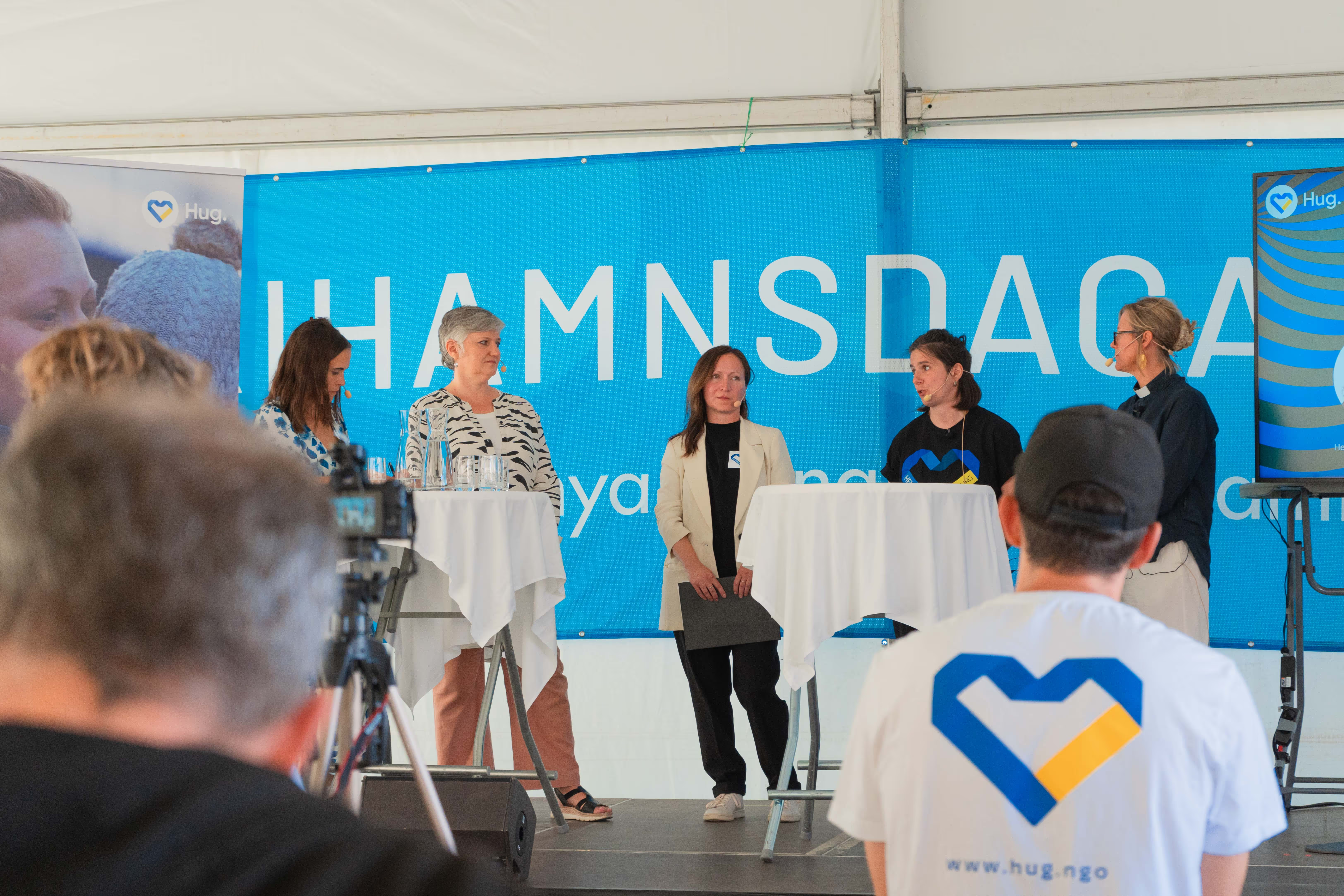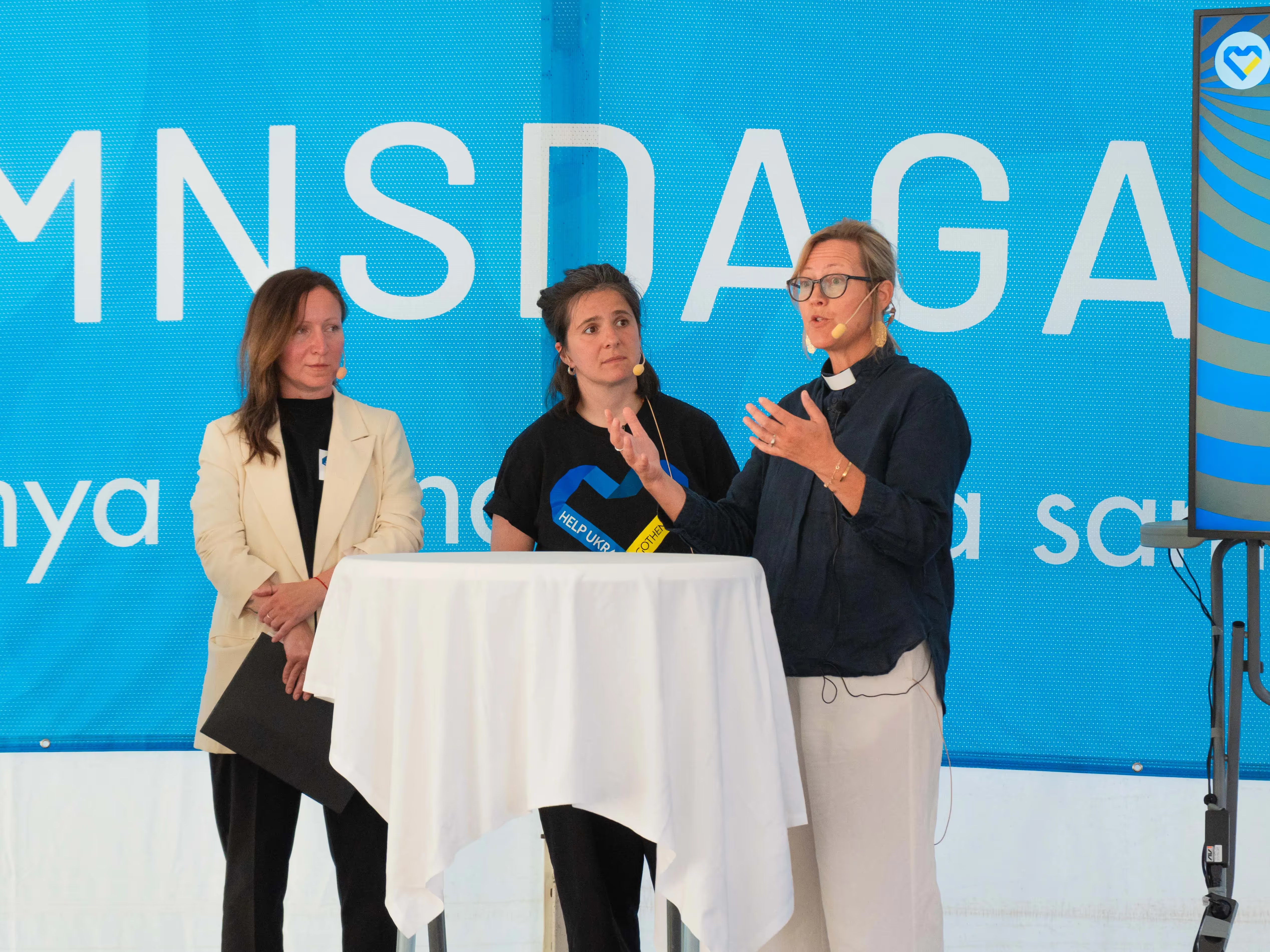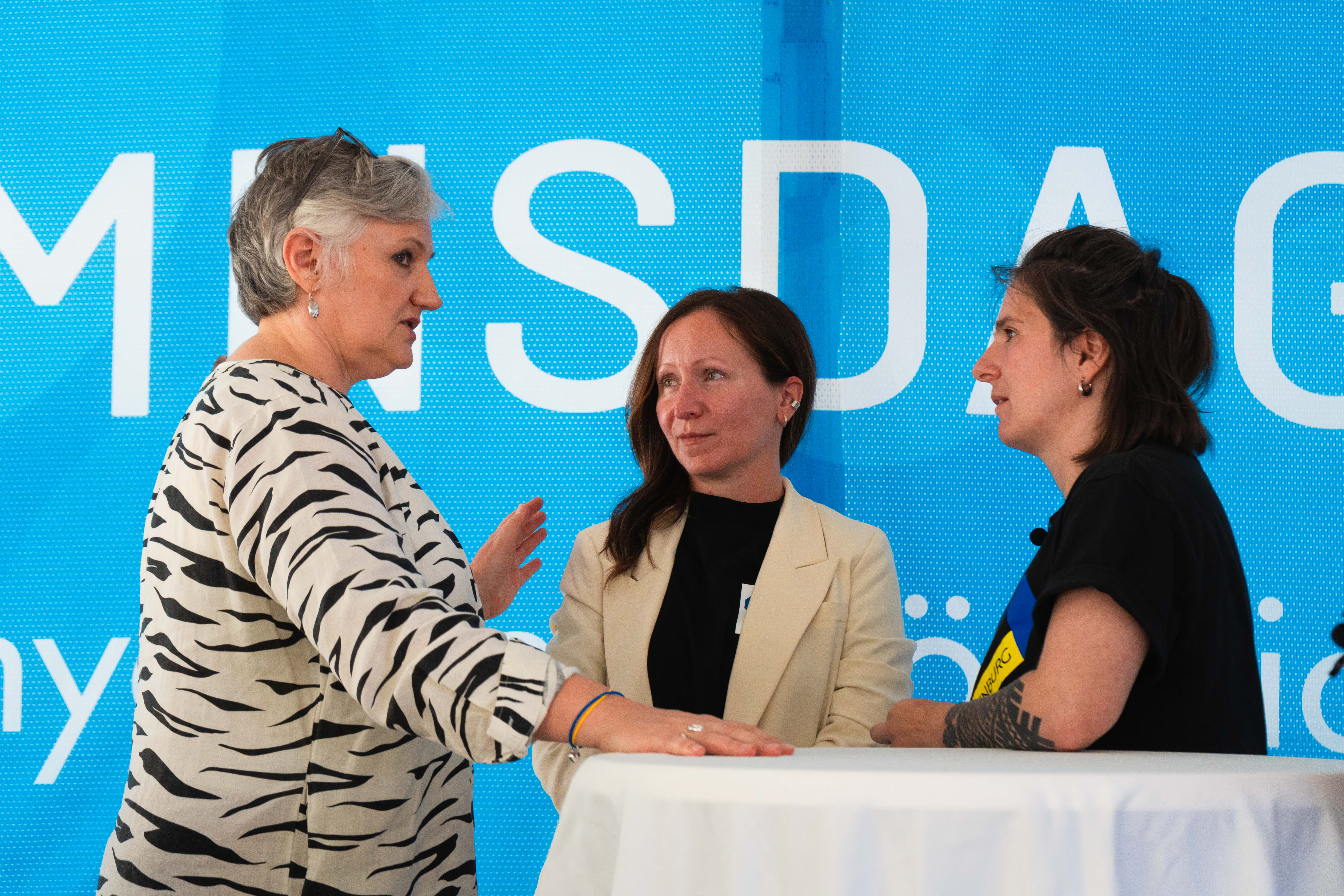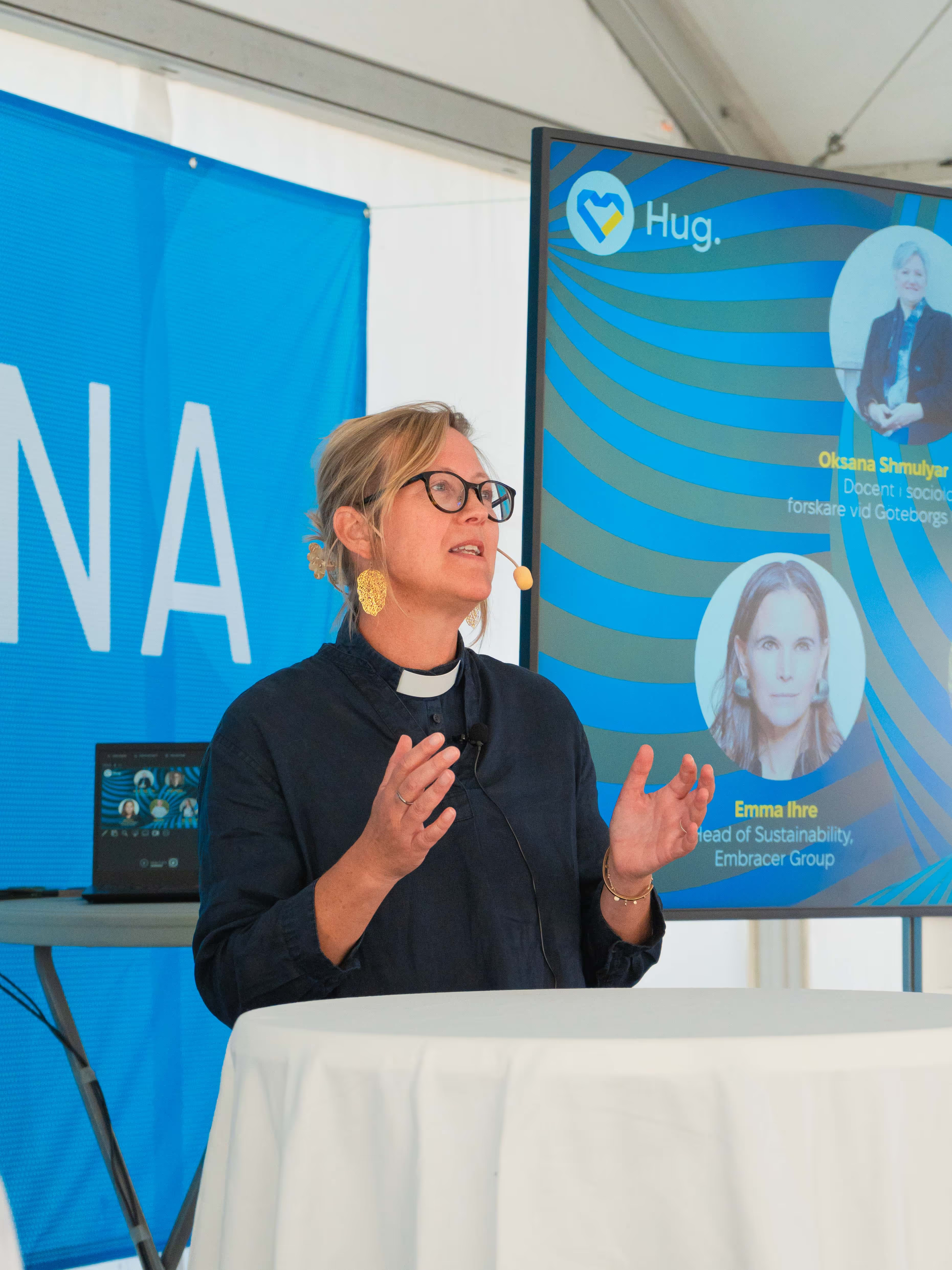
On August 31 2024, Hug organized a panel discussion during Frihamnsdagarna, focusing on mental health support for Ukrainian refugees in Sweden.
After 2.5 years of flexible and responsive efforts in housing, language education, and job market integration, Hug has now shifted its focus to promoting mental health through the project Better You&Me, which has been running for just under a year with 250 participants. The panel discussion highlighted the challenges brought by war trauma and explored how we can create a safe environment in Sweden where Ukrainians can heal and thrive.
Inclued in the panel is:

Katja Blank begins by highlighting Hug's greatest strength: their quick and efficient response to migrants' needs. She explains how Hug early identifies and meets the challenges that arise when people arrive in Sweden.
Emma mentions that there is a great need for Hug's help and asks how the prioritization of the Better You&Me project contributes to meeting these needs.
“There are very urgent needs here and now, but there are also long-term needs, and mental health is incredibly important for us to be able to continue living from here. It is a long-term investment in our well-being and in this community,” says Katja Blank.
Oksana Shmulyar Gréen describes the major challenges faced by Ukrainian refugees in Sweden, where lacking social structures and uncertain reception conditions create obstacles for integration and well-being. She points out that Sweden’s reception has been more restrictive compared to other Nordic countries, which creates uncertainty and forces refugees to constantly adapt.

“[...] it’s very difficult to learn new things when you are constantly stressed and worried. It’s difficult to claim your rights, because you don't know if you will be allowed to stay here after 2026 or not." says Oksana Shmulyar Green.
Ukrainians in Sweden often live in constant worry for their families back home and struggle with temporary and low-paid jobs that don’t match their qualifications.
Emma Ihre adds that this underutilization of skills is costly for both the individual and society, as talented people aren’t given the opportunity to contribute fully. Oksana emphasizes that these challenges don’t only apply to Ukrainians, but also to other refugee groups, and that a temporary situation makes it difficult to establish a safe and long-term establishment in Sweden.
Yaroslava Schven talks about HUG's Better You&Me project and their work with psychological support for Ukrainian refugees. During the project, which has been going on for just under 1 year, approximately 250 participants received support through individual consultations, group activities and psychological diagnostics. Their research shows that many experience high emotional stress, with 44% feeling burnt out and 35% having suicidal thoughts.

“And that’s because it’s a double trauma. It’s the trauma of the war and the trauma of fleeing and adapting to a new place. They just have to adapt to society, which is incredibly difficult,” says Yaroslava Schven.
Despite the difficult circumstances, the project has led to progress, such as improved emotional stability and increased socialization.
Marika Palmdahl reflects on the changes in the Swedish social contract, where public institutions in Sweden previously took responsibility for social protection and compassion, while non-profit organizations acted as a complement. Today, civil society and non-profit organizations have taken on a more prominent role, especially after the refugee waves in 2015 and 2022, when much of the support for newcomers shifted to these stakeholders.
She also emphasizes the important collaboration between HUG and the Church of Sweden, where one contributes stability and resources, while the other adds flexibility and understanding of the needs of newcomers. In conclusion, she highlights recent years' changes in asylum law;
"We believe and think that when a refugee comes here, then Sweden sort of arranges it", says Marika Palmdahl. "It [asylum law] has really changed so significantly, so all refugees today are only here for a limited time. You sort of don't prepare for someone to stay and have a good life here."
Oksana Shmulyar Green highlights the deep psychological stress Ukrainian refugees experience due to constant uncertainty about their future. This uncertainty affects all aspects of their lives, including housing, work, children's education and legal status, making long-term planning difficult. Their situation is incredibly complex and stressful. They must navigate a new society while living with constant worry and fear for the future.
“[...] you live in total stress and anxiety and are surrounded by a society that lives its life as usual. That duality is enormously stressful because you can't really understand -
What is my body? What is my brain? Am I here just like everyone else?” says Oksana Shmulyar Green.

Emma Ihre adds that the complex reality of refugees is often overlooked by those around them, who may see their situation as a success story once they have found housing and work. However, the reality is very complicated and characterized by shame and isolation, and many refugees avoid burdening their relatives in their home country with their difficulties, further complicating their situation.
Katja Blank emphasizes the importance of clearly defining challenges in our current situation and moving quickly to find concrete solutions.
“This isn’t a problem confined to Ukraine or the Middle East. All wars are everyone’s wars, and it requires responsible politics moving forward,” says Katja Blank. “It demands a holistic approach. It requires us to start having real conversations with each other, and it requires that we give all of us stakeholders out there the opportunity to do this work together.”
Katja calls for decision-makers, such as Ulf Kristersson, to take the time to reflect on what kind of society their politics are building and how they can better support civil society. She believes that current efforts from the government are insufficient and that it is necessary to give civil society both financial and structural resources to be able to fill the gaps that the government has left. She concludes by expressing a hope that together we can create a better and more responsible world in the future.
Emma concludes the panel discussion by emphasizing that mental illness resulting from war is as serious as physical injury and requires great resources. She calls for a greater commitment from Swedes and emphasizes the importance of recognizing and supporting the non-profit forces that help refugees and to give them the resources they need for their work.
“Everyone has a responsibility. Uffe is responsible, but so is the rest of the government. It’s the business sector, it’s civil society, it’s all of us here and those we know. And as the saying goes, no one can do everything, but everyone can do something,” says Emma Ihre.
A big thank you to our amazing panel participants who came and contributed with their insights and dedication!